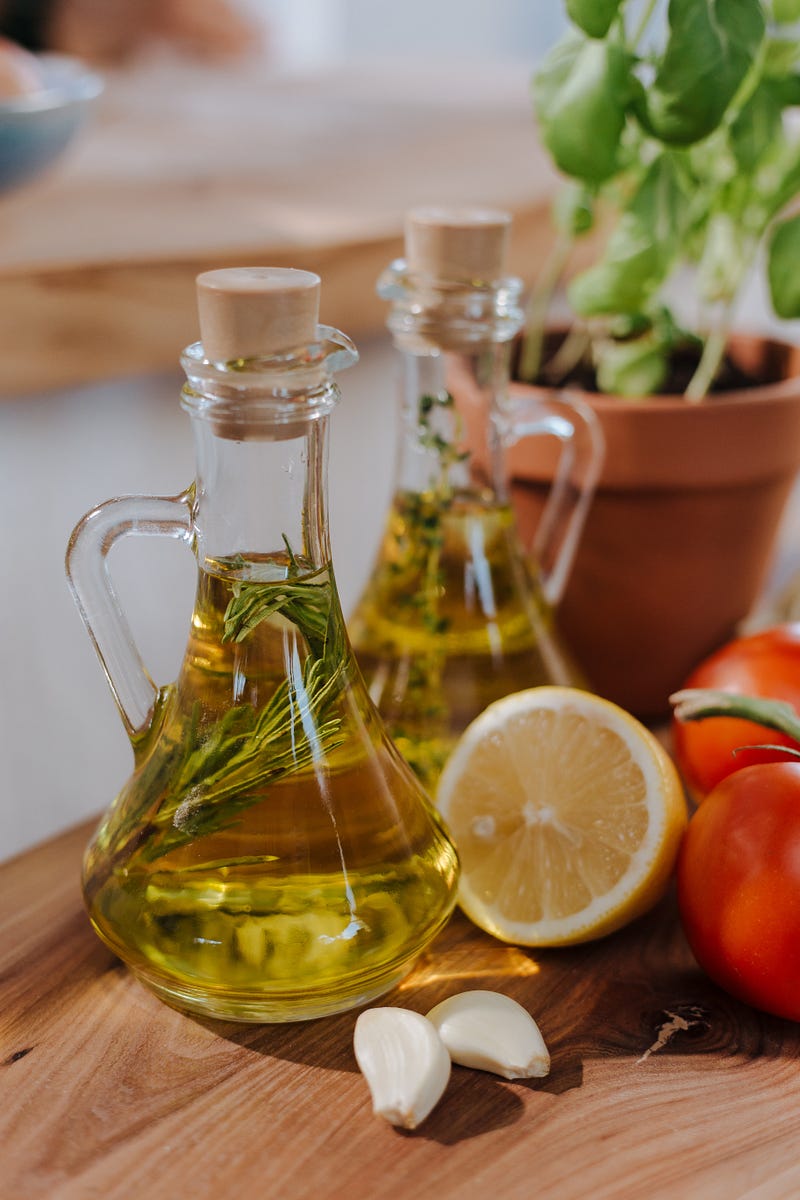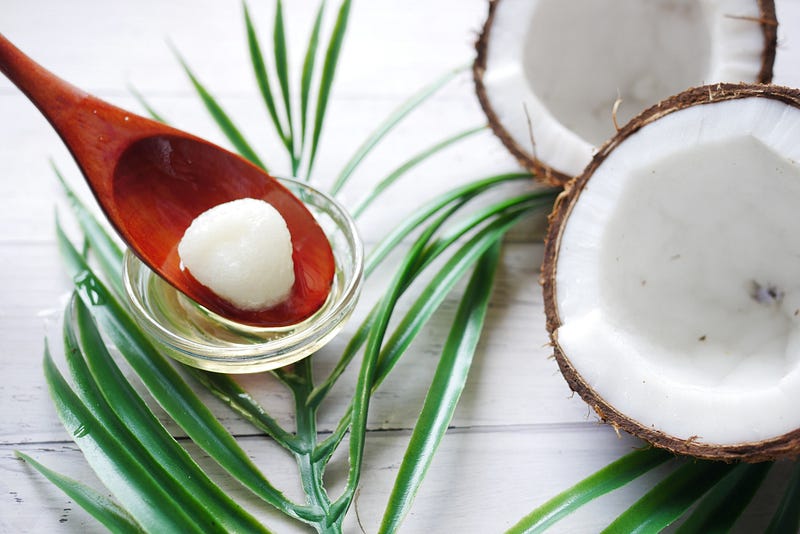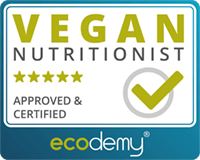Learn about the health properties of oils from a vegan nutritionist
I’ve talked to another vegan nutritionist and asked her, What’s the healthiest oil now?” and she answered flat out, coconut oil — This is not quite right.

Visit activeplantbased for professional help and plant-based nutrition training.
The Omega Ratio
The ideal ratio of omega-6 to omega-3 fatty acids in the diet is between 1:1 and 4:1. However, the typical Western diet tends to have a much higher ratio of omega-6 to omega-3 fatty acids, often exceeding 20:1. This imbalance has been associated with increased inflammation and a higher risk of chronic diseases such as heart disease, cancer, and arthritis.
So the answer here is: Any type of oil can be harmful if the omega ratio is imbalanced. Now how do we fix this?
The Winner: Flaxseed
Among vegan oils, flaxseed oil is the best choice when it comes to the omega-3 to omega-6 ratio. Flaxseed oil is an excellent source of alpha-linolenic acid (ALA), which is an omega-3 fatty acid. Depending on the source, it has a high omega-3 to omega-6 ratio, around 4:1 or even 1:1.
However, it’s important to note that flaxseed oil is unsuitable for cooking as it’s easily damaged by heat, light, and oxygen. Instead, it’s best used in dressings, dips, and other cold applications.
Also, flaxseed does have a distinct taste that you might like or dislike. Try it a couple of times and give it a chance.
Walnut
Walnut oil is another vegan oil that is relatively high in omega-3 fatty acids, specifically alpha-linolenic acid (ALA), which is an essential fatty acid that must be obtained from the diet. Compared to other vegan oils, walnut oil has a more balanced ratio of omega-3 to omega-6 fatty acids, with a ratio of around 4:1.
In addition to its high omega-3 content, walnut oil is also rich in antioxidants and has been shown to have potential health benefits, such as improving heart health and reducing inflammation. However, like flaxseed oil, walnut oil is unstable at high temperatures and is best used in cold applications, such as dressings and dips. Using it in high-heat cooking can cause it to become rancid and lose its nutritional benefits.
Chia & Hemp
On the second place of vegan oils that are relatively high in omega-3 fatty acids are chia seed oil and hemp seed oil, but they might not be as widely available as flaxseed oil, depending on your region.
Avocado & Olive
Avocado and olive oil have much lower levels of omega-3 fatty acids but are still considered healthy due to their high levels of monounsaturated fatty acids and antioxidants.
Oils And Their Health Benefits
Let’s dive into some of the health benefits and properties. Several vegan oils are considered healthy due to their nutritional profiles and possible health outcomes. Here are some of the most notable options:
- Extra-virgin olive oil: Extra-virgin olive oil is a staple in the Mediterranean diet and has been shown to have numerous health benefits, including reducing inflammation, improving heart health, and potentially reducing the risk of certain types of cancer. It’s high in monounsaturated fatty acids and antioxidants.
- Coconut oil: Coconut oil has gained popularity in recent years for its potential health benefits, including improving cognitive function and reducing inflammation. It’s high in saturated fatty acids, but some studies suggest it may not negatively impact heart health, as previously believed.
- Avocado oil: Avocado oil is rich in monounsaturated fatty acids and antioxidants and may have benefits for heart health and reducing inflammation. It also has a high smoke point, making it a good option for cooking at high temperatures.
- Flaxseed oil: Flaxseed oil is rich in alpha-linolenic acid, an omega-3 fatty acid, as discussed above, that has been shown to have numerous health benefits, similar to the ones of avocado oil. However, it should be used in moderation as it’s unstable at high temperatures and can easily become rancid.
- Hemp seed oil: Hemp seed oil is rich in omega-3 and omega-6 fatty acids, which are important for overall health. It may as well have benefits for reducing inflammation and improving heart health.
- Olive oil: Olive oil is known for its heart-healthy monounsaturated fat content, which helps reduce bad cholesterol levels and can help reduce the risk of stroke and heart disease.
It’s worth noting that while these oils are generally considered healthy, they should still be used in moderation as they are high in calories and fat. It’s also important to choose high-quality, unrefined oils whenever possible to ensure that you’re getting the most nutritional benefits.
Common Myths Around The Topic
Several common myths about oils persist despite evidence to the contrary. Here are a few of them and why they are not accurate:

Myth 1: Saturated fats are always unhealthy, and unsaturated fats are always healthy.
While it’s true that some saturated fats are associated with an increased risk of heart disease, not all saturated fats are created equal. For example, coconut oil, which is high in saturated fat, has been shown in some studies to have potential health benefits. Similarly, some unsaturated fats, such as trans fats, are unhealthy and should be avoided.
Coconut oil is an example of saturated fat that has been shown in some studies to have potential health benefits, such as improving cholesterol levels and reducing inflammation.
On the other hand, trans fats, which are unsaturated fats that have been artificially modified through a process called hydrogenation, are unhealthy and have been linked to an increased risk of heart disease.
Myth 2: All vegetable oils are created equal.
Different vegetable oils have other nutritional profiles and potential health benefits. Take olive and canola oil, for example.
Olive oil is an example of a vegetable oil high in monounsaturated fatty acids and antioxidants, making it a healthy choice. Canola oil is another vegetable oil that is high in monounsaturated and polyunsaturated fatty acids and low in saturated fat, making it a good option for heart health.
Myth 3: Heating vegetable oils to high temperatures produces harmful compounds that can increase the risk of cancer and other diseases.
While it’s true that heating oils can produce harmful compounds, the degree to which this occurs depends on the type of oil and the cooking method.
Some oils are more stable at high temperatures than others, and the degree to which they produce harmful compounds when heated can vary. For example, olive oil has a high smoke point and is relatively stable when heated, making it a good choice for high-heat cooking and even frying your food. Yes, you read that right; frying with olive oil is not a problem, contrary to popular belief.
Coconut oil and avocado oil also have high smoke points, but flaxseed oil and hemp seed oil are not suitable for high-heat cooking due to their low smoke points and susceptibility to oxidation.
Where can I find “unhealthy fats”?
Margarine
Margarine s a spread made from vegetable oils that have been partially hydrogenated to make them solid at room temperature. This process creates trans fats, which can increase LDL cholesterol (the “bad” cholesterol) and decrease HDL cholesterol (the “good” cholesterol), increasing the risk of heart disease.
Fried foods
Many fried foods, such as French fries and (chicken) nuggets, are cooked in oils that have been partially hydrogenated, which can create trans fats.
Baked stuff
Many baked goods, such as pastries, cookies, and crackers, may contain partially hydrogenated oils to improve their texture and shelf life.
Processed foods
Many processed foods, such as snacks and frozen meals, may contain partially hydrogenated oils to enhance their flavour and texture.
It’s important to note that trans fats are being phased out of the food supply in many countries due to their negative health effects.
Partially hydrogenated oils
These oils are not a specific type of oil but rather oils that have been chemically altered through a process called hydrogenation. During hydrogenation, hydrogen gas is added to a liquid vegetable oil under high pressure and high temperature to make it more solid and stable at room temperature.
Partially hydrogenated oils are used in many processed foods because they can increase the shelf life and improve the texture of products. However, the hydrogenation process also creates trans fats, which have been linked to an increased risk of heart disease.
Partially hydrogenated oils can be made from various vegetable oils, including soybean, cottonseed, and palm oil.
Most foods are now cooked in vegetable oils that have not been partially hydrogenated, such as soybean oil, canola oil, and sunflower oil.
While these oils do not contain trans fats, they are still high in calories and may contribute to weight gain and other health issues if consumed excessively. Therefore, it’s important to enjoy fried foods in moderation and balance them with plenty of fruits, vegetables, whole grains, and proteins.
Hydrogenated vs Trans Fat — Health Aspect
Both trans fats and hydrogenated oils are considered unhealthy for consumption. Why is that?
Trans fats are unsaturated fats that are created during the hydrogenation process when some of the unsaturated fats in vegetable oils are converted (to trans fats). Trans fats have been linked to an increased risk of heart disease and other health problems.
Trans fats are often considered “worse” for health than saturated fats because they raise not only LDL (bad) cholesterol levels but also lower HDL (good) cholesterol levels. This can increase the risk of heart disease and other health problems. However, it’s important to note that not all unsaturated fats are bad for health, and some, like omega-3 and omega-6 fatty acids, are considered essential for good health.
On the other hand, hydrogenated oils are vegetable oils that have been chemically modified through hydrogenation to make them more stable and solid at room temperature.
Partially hydrogenated oils contain trans fats and have been linked to an increased risk of heart disease. Fully hydrogenated oils do not contain trans fats, but they are still high in saturated fat and are not considered healthy. For this reason, many health experts recommend limiting or avoiding hydrogenated oils as much as possible.
In summary, both trans fats and hydrogenated oils are considered unhealthy for consumption due to their negative effects on heart health and other health issues.
In conclusion, there are a variety of cooking oils available with different properties, health benefits, and uses. It is important to choose the right oil in order to reap the health benefits that each one has to offer. Each oil has unique properties and benefits that can help add flavour to your dishes and provide a variety of nutrients.
Whether you are looking for a healthy cooking oil or one that suits your dietary needs, there is an option for everyone. By understanding which oils have the most nutritional value, you can make the best choices for you and your family.
Thank you for reading and supporting our love of writing.
─ the activeplantbased pub 🐇

